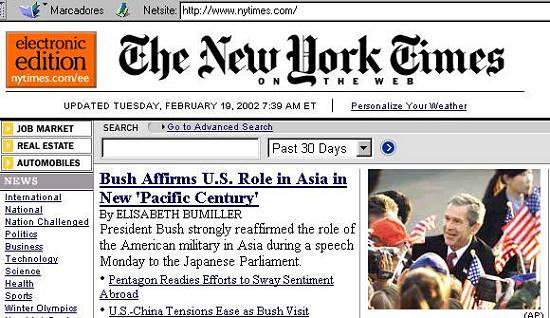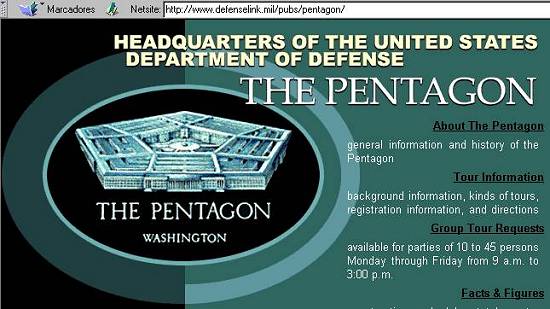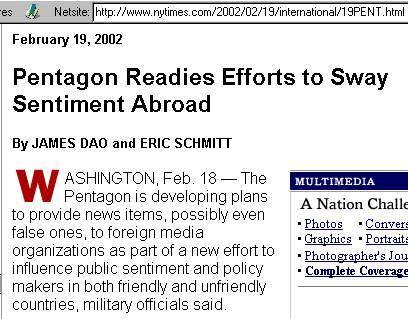 February
19, 2002 February
19, 2002
Pentagon
Readies Efforts to Sway Sentiment Abroad
By JAMES
DAO and ERIC SCHMITT
 ASHINGTON,
Feb. 18 — The Pentagon is developing plans to provide news items, possibly
even false ones, to foreign media organizations as part of a new effort
to influence public sentiment and policy makers in both friendly and unfriendly
countries, military officials said. ASHINGTON,
Feb. 18 — The Pentagon is developing plans to provide news items, possibly
even false ones, to foreign media organizations as part of a new effort
to influence public sentiment and policy makers in both friendly and unfriendly
countries, military officials said.
The plans,
which have not received final approval from the Bush administration, have
stirred opposition among some Pentagon officials who say they might undermine
the credibility of information that is openly distributed by the Defense
Department's public affairs officers.
The military
has long engaged in information warfare against hostile nations — for instance,
by dropping leaflets and broadcasting messages into Afghanistan when it
was still under Taliban rule.
But it recently
created the Office of Strategic Influence, which is proposing to broaden
that mission into allied nations in the Middle East, Asia and even Western
Europe. The office would assume a role traditionally led by civilian agencies,
mainly the State Department.
The small but
well-financed Pentagon office, which was established shortly after the
Sept. 11 terrorist attacks, was a response to concerns in the administration
that the United States was losing public support overseas for its war on
terrorism, particularly in Islamic countries.
As part of
the effort to counter the pronouncements of the Taliban, Osama bin Laden
and their supporters, the State Department has already hired a former advertising
executive to run its public diplomacy office, and the White House has created
a public information "war room" to coordinate the administration's daily
message domestically and abroad.
Secretary of
Defense Donald H. Rumsfeld, while broadly supportive of the new office,
has not approved its specific proposals and has asked the Pentagon's top
lawyer, William J. Haynes, to review them, senior Pentagon officials said.
Little information
is available about the Office of Strategic Influence, and even many senior
Pentagon officials and Congressional military aides say they know almost
nothing about its purpose and plans. Its multimillion dollar budget, drawn
from a $10 billion emergency supplement to the Pentagon budget authorized
by Congress in October, has not been disclosed.
Headed by Brig.
Gen. Simon P. Worden of the Air Force, the new office has begun circulating
classified proposals calling for aggressive campaigns that use not only
the foreign media and the Internet, but also covert operations.
The new office
"rolls up all the instruments within D.O.D. to influence foreign audiences,"
its assistant for operations, Thomas A. Timmes, a former Army colonel and
psychological operations officer, said at a recent conference, referring
to the Department of Defense. "D.O.D. has not traditionally done these
things."
One of the
office's proposals calls for planting news items with foreign media organizations
through outside concerns that might not have obvious ties to the Pentagon,
officials familiar with the proposal said.
General Worden
envisions a broad mission ranging from "black" campaigns that use disinformation
and other covert activities to "white" public affairs that rely on truthful
news releases, Pentagon officials said.
"It goes from
the blackest of black programs to the whitest of white," a senior Pentagon
official said.
Another proposal
involves sending journalists, civic leaders and foreign leaders e-mail
messages that promote American views or attack unfriendly governments,
officials said.
Asked if such
e-mail would be identified as coming from the American military, a senior
Pentagon official said that "the return address will probably be a dot-com,
not a dot-mil," a reference to the military's Internet designation.
To help the
new office, the Pentagon has hired the Rendon Group, a Washington-based
international consulting firm run by John W. Rendon Jr., a former campaign
aide to President Jimmy Carter. The firm, which is being paid about $100,000
a month, has done extensive work for the Central Intelligence Agency, the
Kuwaiti royal family and the Iraqi National Congress, the opposition group
seeking to oust President Saddam Hussein.
Officials at
the Rendon Group say terms of their contract forbid them to talk about
their Pentagon work. But the firm is well known for running propaganda
campaigns in Arab countries, including one denouncing atrocities by Iraq
during its 1990 invasion of Kuwait.
The firm has
been hired as the Bush administration appears to have united around the
goal of ousting Mr. Hussein. "Saddam Hussein has a charm offensive going
on, and we haven't done anything to counteract it," a senior military official
said.
Proponents
say the new Pentagon office will bring much-needed coordination to the
military's efforts to influence views of the United States overseas, particularly
as Washington broadens the war on terrorism beyond Afghanistan.
But the new
office has also stirred a sharp debate in the Pentagon, where several senior
officials have questioned whether its mission is too broad and possibly
even illegal.
Those critics
say they are disturbed that a single office might be authorized to use
not only covert operations like computer network attacks, psychological
activities and deception, but also the instruments and staff of the military's
globe- spanning public affairs apparatus.
Mingling the
more surreptitious activities with the work of traditional public affairs
would undermine the Pentagon's credibility with the media, the public and
governments around the world, critics argue.
"This breaks
down the boundaries almost completely," a senior Pentagon official said.
Moreover, critics
say, disinformation planted in foreign media organizations, like Reuters
or Agence France-Presse, could end up being published or broadcast by American
news organizations.
The Pentagon
and the Central Intelligence Agency are barred by law from propaganda activities
in the United States. In the mid-1970's, it was disclosed that some C.I.A.
programs to plant false information in the foreign press had resulted in
articles published by American news organizations.
Critics of
the new Pentagon office also argue that governments allied with the United
States are likely to object strongly to any attempts by the American military
to influence media within their borders.
"Everybody
understands using information operations to go after nonfriendlies," another
senior Pentagon official said. "When people get uncomfortable is when people
use the same tools and tactics on friendlies."
Victoria Clarke,
the assistant secretary of defense for public information, declined to
discuss details of the new office. But she acknowledged that its mission
was being carefully reviewed by the Pentagon.
"Clearly the
U.S. needs to be as effective as possible in all our communications," she
said. "What we're trying to do now is make clear the distinction and appropriateness
of who does what."
General Worden,
an astrophysicist who has specialized in space operations in his 27-year
Air Force career, did not respond to several requests for an interview.
General Worden
has close ties to his new boss, Douglas J. Feith, the under secretary of
defense for policy, that date back to the Reagan administration, military
officials said. The general's staff of about 15 people reports to the office
of the assistant secretary of defense for special operations and low-intensity
conflict, which is under Mr. Feith.
The Office
for Strategic Influence also coordinates its work with the White House's
new counterterrorism office, run by Wayne A. Downing, a retired general
who was head of the Special Operations command, which oversees the military's
covert information operations.
Many administration
officials worried that the United States was losing support in the Islamic
world after American warplanes began bombing Afghanistan in October. Those
concerns spurred the creation of the Office of Strategic Influence.
In an interview
in November, Gen. Richard B. Myers, chairman of the Joint Chiefs of Staff,
explained the Pentagon's desire to broaden its efforts to influence foreign
audiences, saying:
"Perhaps the
most challenging piece of this is putting together what we call a strategic
influence campaign quickly and with the right emphasis. That's everything
from psychological operations to the public affairs piece to coordinating
partners in this effort with us."
One of the
military units assigned to carry out the policies of the Office of Strategic
Influence is the Army's Psychological Operations Command. The command was
involved in dropping millions of fliers and broadcasting scores of radio
programs into Afghanistan encouraging Taliban and Al Qaeda soldiers to
surrender.
In the 1980's,
Army "psyop" units, as they are known, broadcast radio and television programs
into Nicaragua intended to undermine the Sandinista government. In the
1990's, they tried to encourage public support for American peacekeeping
missions in the Balkans.
The Office
of Strategic Influence will also oversee private companies that will be
hired to help develop information programs and evaluate their effectiveness
using the same techniques as American political campaigns, including scientific
polling and focus groups, officials said.
"O.S.I. still
thinks the way to go is start a Defense Department Voice of America," a
senior military official said. "When I get their briefings, it's scary." |


 Afeganistão,
com o objetivo de furar bloqueios e censuras que impedem à população
local o acesso às informações internacionais.
Afeganistão,
com o objetivo de furar bloqueios e censuras que impedem à população
local o acesso às informações internacionais.

 February
19, 2002
February
19, 2002